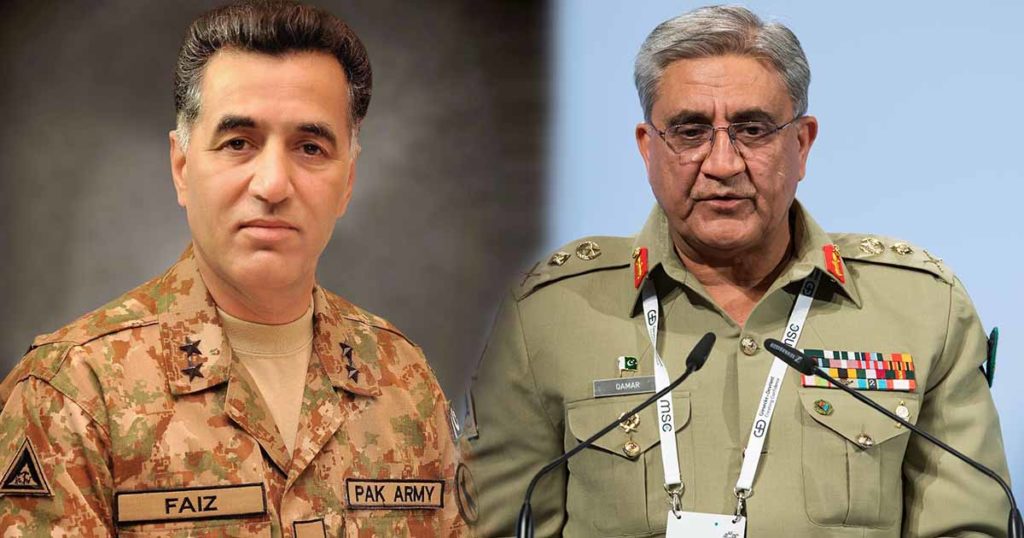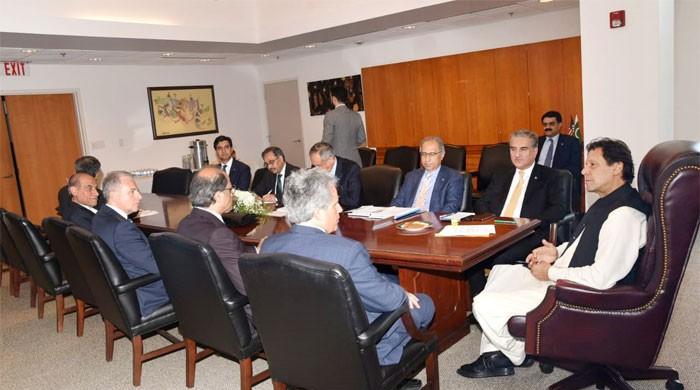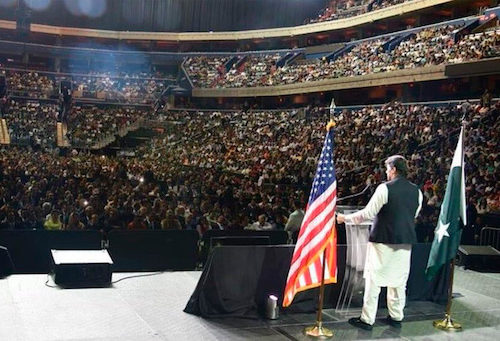All of Imran Khan’s trips abroad as PM has been of great importance to Pakistan. The most anticipated (and more important than others) was his 3-day trip of the United States (US). Primarily Pakistan badly needed to mend fences with the US on a number of thorny issues, secondarily we had to attract very much needed investment. Travelling with a small delegation to Washington DC on a Qatar Airways commercial flight to save money, this trip has cost the national exchequer about US$50,000 cost of former PM Nawaz Sharif’s last trip to the US was reportedly US$470,000. Imran Khan opted to stay at the Pakistani Ambassador’s residence instead of a hotel in order to further cut costs.
The visit was a huge success seen from any angle. In a meeting at the Embassy of Pakistan in Washington DC, PM Imran Khan invited Pakistani American businessmen and investors to benefit from economic and business opportunities in Pakistan afforded by Pakistan’s strategic location and connectivity to the broader region. Generally the investors were appreciative of the current much improved security situation in Pakistan and many identified areas of interest for investment in sectors such as energy and tourism. The meeting ended on a very positive note. The Acting Managing Director of the International Monetary Fund (IMF), David Lipton also met the PM Imran Khan, discussing a wide range of economic issues specifically the recent economic developments and the implementation of the authority’s economic reform programme supported by the IMF.PM Khan also had a short meeting with World Bank President David Malpass at the Pakistani Embassy.
His address to the Pakistani American community on July 21 at the Capital One Arena in Wash DC went exceptionally well, almost 25-30000 gathered to hear their leader speak, some called probably it “the largest gathering of Pakistani-Americans in history” by far with the PM telling the people that a ‘Naya Pakistan’ was being created in front of people’s eyes. He said that it was unfortunate that in Pakistan democracy was a “type of monarchy” a neo-feudal system where merit did not come into play. The applauding crowd was told that one factor that takes democracy forward was the leaders must be answerable. There had been no accountability of leaders in Pakistan previously.

To rebuild the trust between the US and Pakistan, it is important to re-establish the “military to military” (mil-mil) contact. This distrust is doubly tragic because in accomplishing the mutual aim of eradicating the militants the Pakistan Army has done a magnificent job in the mountains and plains of FATA and SWAT. After Sir Gerald Templar’s successful Malayan campaign in the 1950s, ours is the only Army in the world to have run a successful counter-insurgency and counter-terrorism campaign. Pakistan’s Chief of the Army Staff (COAS) Gen Qamar Javed Bajwa and the Director General of Inter-Services Intelligence (ISI) Lt Gen Faiz Hameed were a part of the PM’s delegation. While the head of govt being accompanied by the country’s Army Chief in the meeting with a US President might be a rare occurrence, this excellent move sent a strong message to Washington (and to the world at large) that the civilian and military leadership are on the same page on all issues, unlike what has been happened historically in the past. More importantly, since Pakistan became independent in 1947 the military to military relationship has been one of the primary pillars of Pakistan-US ties. Military ties have become the cornerstone of the bilateral relationship with the US military brass seeing the strong Pakistani military as a stabilising factor in a rather volatile part of the world. PM Imran Khan held talks with President Donald Trump on July 22 in which he was also accompanied by Gen Qamar Bajwa. Later Gen Qamar Javed Bajwa met the US Defence Secretary Patrick M. Shanahan, the new Chairman of Joint Chiefs of Staff Gen Mark Milley and other senior officials during his visit to the Pentagon. In the context of the situation in Afghanistan this visit also provided Pakistan leadership, civil and military, an excellent opportunity to explore with Donald Trump and his team the possibility of withdrawing the bulk of the remaining US troops in the coming months. It seems the US has come to understand Pakistan’s genuine security fears and concerns in the region, particularly that India is constantly sponsoring state terrorism against Pakistan blatantly. The only reason peace talk in Afghanistan are progressing well is because India is out of the equation. India used Russian lives, money and Afghanistan as a platform for a proxy war against Pakistan in the 80s, this was replaced followed by American lives, money and Afghanistan for the last 20 years. When will Afghanistan ever realise that India destroyed their country for their hatred against Pakistan and by default all Muslims? Are they deaf, dumb and blind as to how Modi and his BJP treat Muslims in India?
To quote my article of May 31, 2018, “Diversifying our security-related cooperation towards China and Russia, we have taken a hands-on attitude in promoting the peace process in Afghanistan. The Army has succeeded in stabilizing the tribal areas by clearing the Haqqanis and other militant bases in Swat and FATA as well as fencing the vulnerable border to avoid illegal border crossing of militants. The legal foundation for a full-fledged integration of the tribal areas into Pakistan to bring them at par with the rest of the country has been laid,” unquote. The recent elections in FATA, the first ever in history, to the Provincial Assembly have been a watershed in this respect. It destroys the credibility of the Indian-funded well-orchestrated PTM campaign that got undue coverage in the international media.

Pakistan’s bilateral ties with the US nosedived soon after Donald Trump took over as the US President in Jan 2017. A constant echoing of former President Bush’s mantra of “do more”, aiding the Afghan Taliban and accusations of Pakistan playing a double game while being a US ally served only to further spoil the relationship. Tensions between the two were lowered by some of the steps taken by the Pakistan govt prior to the PM visit to the USA. A crackdown was launched on several banned militant outfits, especially the Jamaat ud Dawah (JuD) whose leader Hafiz Saeed was arrested on terror financing charges, this was hailed by Trump. Moreover leaders of Jaish-e-Mohammad (JeM), Lashkar-e-Taiba (LeT) and the Falah-e-Insaniat Foundation, a charity organisation affiliated with JuD, were booked for obtaining assets through terror financing. Several religious seminaries and schools tied to militant groups were also seized and shut down, this was one of the demands of the Financial Action Task Force (FATF), the global terror financial watchdog. Imran Khan visited Washington in a vastly different environment and things are much better than they were for his predecessors during the last ten, fifteen years. The Trump administration has termed the PM’s visit to the White House “an opportunity to repair relations and strengthen cooperation for an enduring partnership”.
To quote my article “Pakistan’s place in globalized world” of May 31, 2018, the last of Six articles on “US-Pakistan Relationship” written more than a year ago, to quote, “We are the crossroads bridge between the different regions of South Asia, Central Asia and Pakistan the Middle East. Our foreign policy commitments have to mirror our special responsibility to keep the region stable. Pakistan needs to work hard to improve relations with our immediate neighbours, this forbids our joining any bloc or having relationships with one country to the exclusion of others. The decision not to join the war in Yemen but to join the Saudi-initiated military alliance against counter-terrorism is an example of how to keep a balance between our next-door neighbour Iran and an old friend Saudi Arabia. Similarly we must maintain the balance between an old ally US, our deep friendship with China and the newly developing relations with Russia. The China Pakistan Economic Corridor (CPEC) is a great economic force-multiplier for us, it is fortunately for us a Chinese economic strategic compulsion. We need to work hard to revive our relationship with the US to an even keel. Pakistan’s national interest lies in being a member of no bloc but to be friends with all the blocs,” unquote. Diplomacy is the art of the possible and there is always the possibility of an opportunity to recalibrate bumpy bilateral relations. A senior US administration official said that the “door is open” to repair relations and build an enduring partnership if Islamabad “changes its policies about terrorists and militants”. With Pakistan showing positive intent on this aspect. This very successful visit by Imran Khan will make it possible to repair bilateral relations and strengthen cooperation for an enduring partnership a reset in Islamabad-Washington ties is now definitely in the works. Unlike the Zardari and Nawaz Sharif families Imran Khan does not have assets and money abroad that can be used as a Sword of Damocles for tax evasion and money-laundering to blackmail and thus to dictate their strategic objectives and interests to our leaders to be detriment of Pakistan. Imran’s visit was successful but not at the cost of making Pakistan into a scapegoat or by the US dictating ties. I am not a member of PTI and will never be but as a Pakistani I am proud of you, Imran!.




